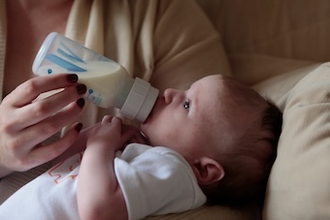Hungry babies and political decisions

Photo by Lucy Wolski on Unsplash
In the coming days many MPs will be attending a carol service or Nativity play in their constituency. As they hear the Christmas story of a baby born two thousand years ago, we must hope that they will consider how babies born today in their own communities are faring.
It is a distressing fact that, no matter how much their parents love them and strive to do the best for them, many infants in the UK are deprived of the essentials required for them to thrive. Research from the Food Foundation earlier this year found that across the UK, 24 per cent of households with a child under the age of four had experienced food insecurity in the previous month - that is, they had lacked reliable access to adequate food. And new mothers who are unable to afford an adequate diet themselves may struggle to breastfeed, making them reliant on expensive infant formula. The Food Foundation concluded: "Worrying levels of food insecurity suggest large numbers of babies and young children are at risk of malnourishment."
Charitable responses like food banks, however kind and compassionate, are not an effective or sustainable solution to this societal problem. Indeed, government figures suggest that food bank use represents only the tip of the iceberg of food insecurity. And really, is there any tenable reason why so many families should be going without adequate food in a country with as much wealth as the UK?
Last month, the Independent Food Aid Network released a new report, Reducing infant and maternal food insecurity in the UK in which it said: "It's crucial to continue highlighting the scale and depth of infant food insecurity, but it's more important than ever that parents and carers of infants can access adequate incomes and that this is the primary focus of policy makers. This cohort of people is presenting at food banks because they don't have enough money to afford essentials. In the long term, parents and carers need more money in their pockets through adequate social security payments and secure and fairly paid work…"
The only respectful, just and effective solution to such deprivation is to ensure that parents have enough money to provide for their families. And the most glaringly obvious and simple first step would be to abolish the two child limit on Universal Credit - surely one of the most illogical and mean-spirited polices ever introduced? As the Catholic Bishops of England and Wales declared in September: "Catholic Social Teaching firmly rejects the two-child cap policy on Universal Credit payments on a matter of principle, namely its implication that larger families are a burden, rather than a blessing, to society." As Pope Francis has said: "In a world that is frequently marred by selfishness, a large family is a school of solidarity and sharing; and these attitudes are of benefit to all society."
Many people were hugely disappointed that the new Labour government did not abolish the limit in their first Budget. When we know that 165 people in the UK have a combined wealth of £795 billion, then a measure which would lift 300,000 children out of poverty at a cost of £1.7 billion hardly seems radical or over-ambitious. And of course, it would be a sound investment. We are all of us interconnected, and a generation of healthier, happier children will make a better future for us all.
Happily, not all of the UK takes a Scrooge-like approach. For several years Scotland has been using its limited devolved powers to be more generous towards its children. In 2021 the Scottish Child Payment was introduced for all children under 16 in low-income families. Starting at £10 per week it has since risen to £26.70 per week, putting significantly more cash into the pockets of Scottish parents in comparison to their counterparts in the rest of the UK. And in its latest Budget, the Holyrood Government committed to mitigating the two-child limit in Scotland by 2026.
There is still a very long way to go, with one in four children in Scotland still living in poverty. But as the Joseph Rowntree Foundation report, UK Poverty 2024, says: "Child poverty rates in Scotland (24%) remain much lower than those in England (31%) and Wales (28%) and are similar (if slightly higher) than in Northern Ireland (22%). This is likely to be due, at least in part, to the Scottish Child Payment. This highlights the effect benefits can have in reducing poverty."
It is also worth noting here that in Northern Ireland politicians negotiated significant mitigations to protect people from the worst impacts of Westminster welfare reforms, like the Bedroom Tax and the Benefit Cap. Further evidence that poverty really is a political choice and a question of priorities.
If we're to give every baby born in the UK the safe, secure and healthy start to life which is their human right, a shift towards justice and fairness in all areas of our economy - tax, benefits, jobs, housing etc. - is required. A preferential option for the poor, one might say. It can't be done overnight, but some steps, like the abolition of the two child limit, could be taken quickly and easily. Scotland has made a good start and shown that there is a better way forward. It's to be hoped that people in the rest of the UK will soon look to Scotland and ask, why not us? Why can't we prioritise the welfare of our children? Is there any good reason why not?
So let's hope that our Christmas celebrations, focused on the birth of a baby, will motivate all of us to demand an end to the scandal of infant food insecurity in the UK.
For more information see:
https://foodfoundation.org.uk/publication/kids-food-guarantee-first-infant-formula-february-2024-update#:~:text=Data%20from%20Food%20Foundation%20surveys,%25%20and%2019%25%20respectively).
www.jrf.org.uk/uk-poverty-2024-the-essential-guide-to-understanding-poverty-in-the-uk


















